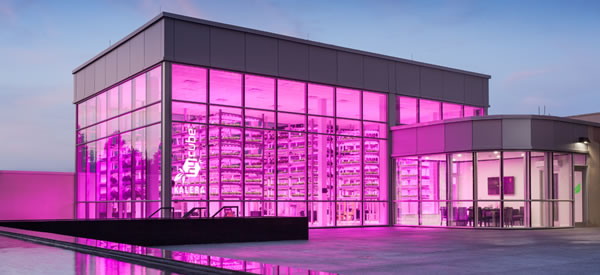Eco Convergence Group Announces Corporate Name Change to Kalera, Breaks Ground on Largest Indoor Vertical Farming Facility in the Southeast

Eco Convergence Group, a leader in indoor vertical farming, announces its official name change to Kalera today. In addition, Kalera also announces that it has begun construction of a state-of-the-art indoor growing facility in Orlando, which will provide an abundance of healthy, tasty greens for the hospitality, grocery, and food service industries.
Last year, the company opened the first of several planned hydroponics HyCube growing centers with the completion of a facility located on the premises of the Orlando World Center Marriott. Kalera is now scaling operations to include a new growing facility, which will be the single largest indoor vertical farm of its kind in the Southeastern United States. Kalera will begin production at the new indoor farm sometime in Q4 of 2019 and is projected to grow over 5 million heads of lettuce annually.
“Our goal at Kalera is to harness plant and data science to deliver new economies of scale in agriculture, making it possible for more people to have access to high-quality, non-GMO, clean, nutritious food, locally grown without the use of pesticides—no matter the season,” said Cristian Toma, CEO of Kalera. “We have proven the technology and refined our production methods to a point where we are ready to scale up.”
Each plant grown in Kalera’s precisely controlled hydroponic facilities receives just the right amount of nutrients, filtered water and air, light, temperature, and humidity to achieve its dense, crisp, colorful, and delectable state. Kalera never uses any pesticides, insecticides, hormones, or GMOs. Unlike traditional farms, Kalera plants aren’t at risk for exposure to contaminants and pathogens in the soil, water, or air.
“Kalera produce is like none other—it’s not just delicious, it’s also clean and beautiful,” said Eric Martinez, Executive Chef, Orlando World Center Marriott Resort & Convention Center. “Having access to Kalera’s exceptional produce year-round opens up limitless possibilities to expand our menu and create new dishes that delight patrons. Many restaurants pride themselves on sourcing ingredients from farms 50 to 100 miles away. We are thrilled to say that we are sourcing our greens from 50 feet away."
Central to Kalera’s business is the idea of good science. The company is planting non-GMO seed, and has perfected over the past years plant and data science driven methods to optimize nutrient mixtures, light recipes, and environmental controls resulting in highly nutritious vegetables with consistent high quality year-round. Kalera is simply working with nature to give plants what they need to thrive, ensuring they reach their full growing and nutritive potential. By using a closed loop irrigation system, Kalera’s plants grow while consuming 95% less water compared to field farming. Furthermore, the company utilizes cleanroom technology and processes to eliminate the use of chemicals and remove exposure to pathogens. With indoor facilities situated right where the demand is, Kalera is able to supply an abundance of produce locally, eliminating the need to travel long distances when shipping perishable products and ensuring the highest quality and freshness.
The new Orlando facility will deliver this high level of quality in abundance to the local market. The company plans for accelerated growth and will build additional facilities as production capacity is further expanded in the US and internationally.
About Kalera
Kalera is a technology-driven vertical farming company that excels in creating optimal conditions to grow delicious, nutritious, non-GMO produce that is free from pesticides and environmental pathogens. Kalera’s high-yield hydroponic production systems are automated, clean-room standard facilities. By utilizing unique methodologies that leverage plant and data technologies, Kalera creates optimal growing conditions for a variety of micro greens, year-round. The company is focused on reducing environmental impact and supplying produce to customers as close to the source as possible.
Comments (0)
This post does not have any comments. Be the first to leave a comment below.
Featured Product

